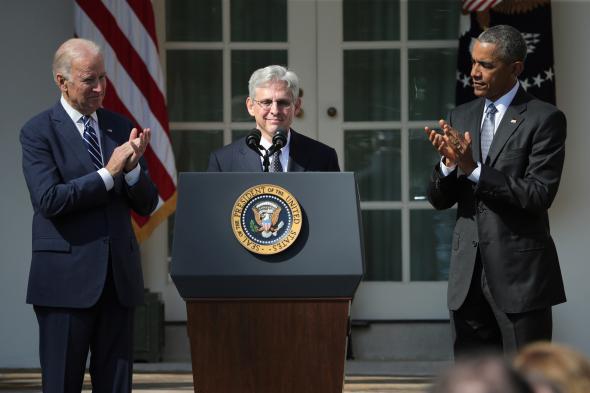Donald Trump’s nominee to the Supreme Court, Neil Gorsuch, has been outspoken in the past about the crippling politicization of the judicial system, particularly the nominating process for prospective federal justices. In a May 2002 remembrance of Supreme Court Justice Byron White, for whom the Trump nominee once clerked, that doubled as a call to arms to fill America’s court benches with the best and brightest, Gorsuch lamented the treatment of the country’s top legal minds and how they were held to unattainable and unhelpful ideological standards to the detriment of the judicial system. “Meanwhile, some of the most impressive judicial nominees are grossly mistreated,” Gorsuch wrote for UPI.
Gorsuch cited two cases he found particularly appalling: the confirmations of current Chief Justice John Roberts and almost–Supreme Court Justice Merrick Garland.
Take Merrick Garland and John Roberts, two appointees to the U.S. Court of Appeals in Washington, D.C. Both were Supreme Court clerks. Both served with distinction at the Department of Justice. Both are widely considered to be among the finest lawyers of their generation. Garland, a Clinton appointee, was actively promoted by Republican Sen. Orrin Hatch of Utah. Roberts, a Bush nominee, has the backing of Seth Waxman, President Bill Clinton’s solicitor general. But neither Garland nor Roberts has chosen to live his life as a shirker; both have litigated controversial cases involving “hot-button” issues. As a result, Garland was left waiting for 18 months before being confirmed over the opposition of 23 senators. Roberts, nominated almost a year ago, still waits for a hearing—and sees no end to the waiting in sight.
“Today, there are too many who are concerned less with promoting the best public servants and more with enforcing litmus tests and locating unknown ‘stealth candidates’ who are perceived as likely to advance favored political causes once on the bench,” Gorsuch wrote. “Politicians and pressure groups on both sides declare that they will not support nominees unless they hew to their own partisan creeds. When a favored candidate is voted down for lack of sufficient political sympathy to those in control, grudges are held for years, and retaliation is guaranteed.”
Gorsuch is surely right that the system is broken and, unfortunately, his nomination to take the seat Merrick Garland earned is evidence of it.
